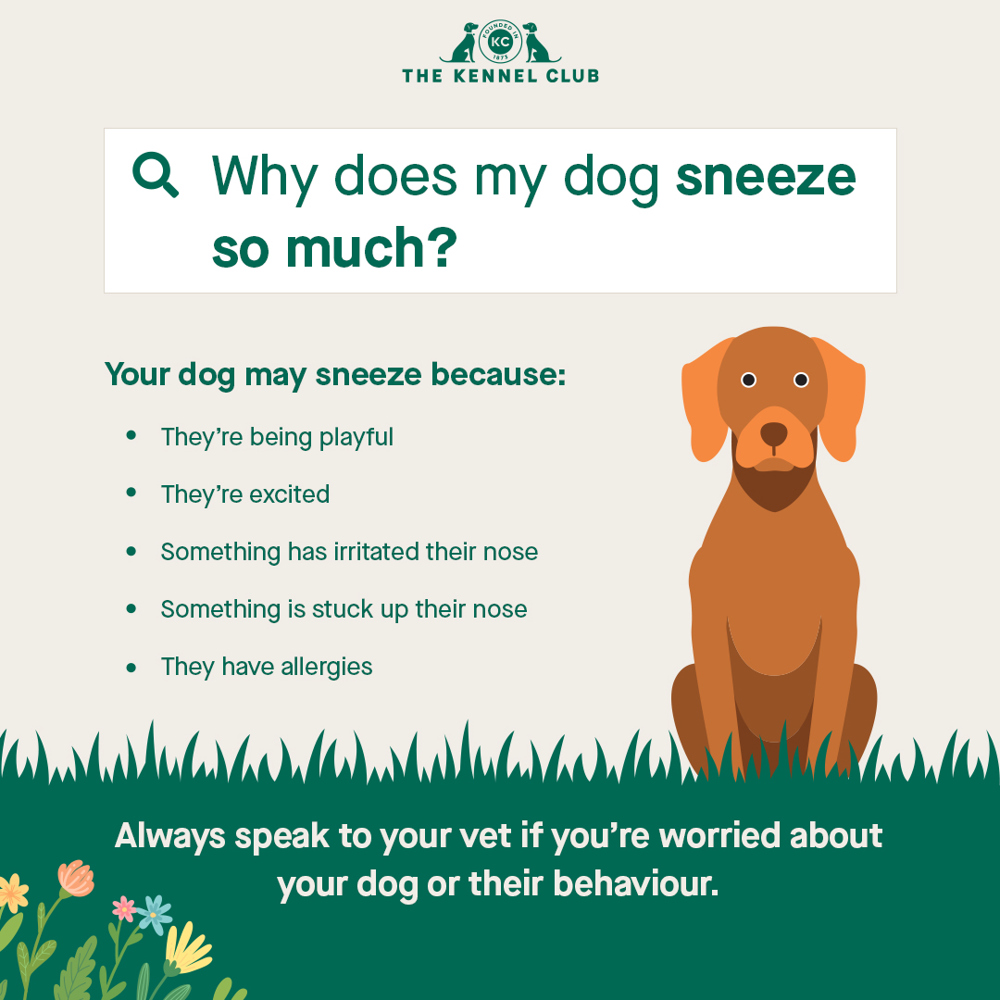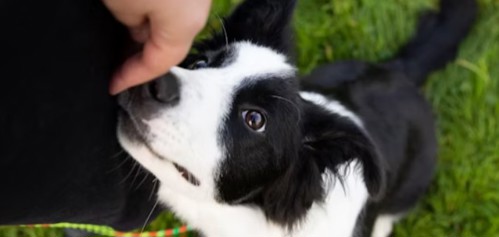
Whether your dog has been sneezing a lot lately, or you’ve noticed that they sometimes sneeze when they’re playing or excited, you might ask yourself why does my dog sneeze so much, what does it mean, are they unwell and should I be worried?
Why does my dog sneeze so much?
Dogs sneeze for a number of reasons. Like us, they sometimes sneeze when their nose is irritated. For dogs, it’s typically caused by dust, pollen or by something that’s got stuck up their nose after rummaging in the undergrowth. But, unlike us, dogs also sneeze as a form of communication to show they’re playing or excited. If your dog is sneezing more than usual, then speak to your vet, especially if they’re sneezing a lot or have other signs of concern, such as nose bleeds, discharge, excessively wet or dry nose or signs of discomfort.
Why do dogs sneeze when they play?
Dogs sometimes sneeze to show that they’re feeling happy, excited or playful. These ‘play sneezes’ are often used during more lively play fights to show that they’re not being aggressive or threatening and are just having fun. Dogs use these sneezes, almost for comedic effect, to help defuse any tension and let their playmate know that they’re not being attacked. Along with wagging their tail, pricking up their ears or licking, these types of sneezes are just another example of how dogs use their bodies to communicate.
The best lifetime dog insurance
Protect your dog with the UK's Number 1 pet insurer, with up to £25,000 cover for vet fees.
What is a reverse sneeze?
Any irritation, swelling or obstruction in your dog’s mouth, throat or nose can cause them to make a strange sound known as a reverse sneeze. This reflex action is a spasm that produces a sudden sharp intake of air through their nose. This action may seem odd, but it helps them to dislodge or remove anything that’s causing discomfort or irritation. A reverse sneeze sounds strange and is often described as a honking, snorting, sneezing sound. It’s more common in dogs that are overweight, smaller or have a flat face (brachycephalic). An episode of reverse sneezing can go on for around half a minute and can seem quite scary if you don’t know what it is. Reverse sneezing may not be comfortable for your dog, but a single episode is usually nothing to be worried about. If your dog has multiple episodes, or you’re concerned about their health, then always speak to your vet.
Is something stuck up my dog’s nose?
If your dog is sneezing a lot and is pawing at their nose, then it’s possible that they may have something stuck up there. Your dog uses their nose and fantastic sense of smell to explore the world and it’s easy for things to get lodged up their nostrils when snuffling around in the undergrowth. Common items found up a dog’s nose include sharp grass seeds, blades of grass, leaves or food. After walks in the countryside always check your dog over for grass seeds and take a peek up their nose too. If you think there may be something stuck up your dog’s nose, then speak to your vet immediately.
What’s irritating my dog’s nose?
A dog’s nose is incredibly sensitive. Dust, pollen, strong perfume, cleaning products, air fresheners, diffusers and hairspray can all cause irritation and make them sneeze. When using aerosols or spray products make sure you use them in a separate room from your dog to help prevent a sneezing fit.
Does my dog have allergies?
Like us, dogs can have an allergy to things like dust and pollen. As well as causing sneezing, allergens can also cause your dog to be itchy, have a runny nose, weeping eyes or cause them to cough too. If you think your dog is affected by allergies, then speak to your vet for advice.
Find out more about food allergies.
Find out more about food allergies.
Why does my dog sneeze only in the morning?
Your dog may be more exposed to higher levels of common allergens during the night. Sleeping close to a dusty floor, surface or bedding could impact a dust allergy, while pollen counts are usually highest first thing in the morning before we wake up. Being exposed throughout the night could cause a morning allergy flare-up, making them repeatedly sneeze. It’s possible that your dog might sneeze a lot just after waking up, shake it off and then get on with the rest of their day without another sneeze in sight, but it’s still worth speaking to your vet. Sneezing could be a sign of a number of different issues and it’s worth getting your dog checked over.
Can dogs get nasal infections?
Dogs can sometimes develop upper respiratory tract infections, but these are often accompanied by coughing. Sometimes dogs can pick up a fungal infection from rooting around in the soil. These infections can cause your dog to sneeze and are often accompanied by pain, nose bleeds or a creamy/green coloured discharge from the nose. Dogs that particularly enjoy digging around in the dirt or those with longer noses are usually more likely to be infected. If you’re concerned about your dog’s health, then always speak to your vet for advice.
Can a tooth infection cause my dog to sneeze?
Sneezing can sometimes be a sign of tooth decay, gum disease or an abscess. Some of the teeth in your dog’s mouth have long roots that extend very close to their nasal passages. An infected tooth can sometimes spread the infection further up, making them sneeze or have a runny nose.
Is sneezing a sign of kennel cough?
Sneezing can sometimes be a possible sign of kennel cough, but it’s unlikely to occur by itself. Dogs with kennel cough may sneeze or have a runny nose, but they typically have a distinctive persistent cough that sounds more like something is stuck in their throat or a goose’s honk. If you think your dog may have kennel cough, then contact your vet for advice. Kennel cough can be very contagious and may be dangerous to puppies and older or vulnerable dogs, so it’s important to call your vet before going to see them.
Find out more about kennel cough.
Find out more about kennel cough.
Can nasal tumours cause sneezing?
In rare cases, some senior dogs may develop a tumour in their nasal passage, causing irritation that leads to sneezing and nose bleeds. Some of these growths may be benign, such as polyps and cysts, but others may be cancerous. It’s important that if your dog does begin to sneeze frequently, then you speak to your vet for advice, particularly if theyy dog is older.
Could my dog have nasal mites?
Nasal mites are not common in the UK, but have been reported in other parts of Europe. These tiny creatures can infect a dog when they dig and rub their nose in the earth, causing sneezing fits, nasal discharge, nose bleeds and itching. If you suspect your dog might have nasal mites, then speak to your vet for advice.
Sneezing and brachycephalic dogs
Flat-faced dogs, such as Bulldogs, Pugs and French Bulldogs, tend to have shorter and narrower nostrils that can make them more at risk of respiratory issues, including reverse sneezing and respiratory infections. If your flat-faced dog has breathing issues, or repeatedly sneezes, then it’s important that you speak to your vet about their health.
When should I be worried if my dog is sneezing?
If your dog sneezes a few times and has no other signs of illness or discomfort, then it’s unlikely to be something to worry about. If your dog shows any of the following signs, then you should speak to your vet for advice immediately:
- Excessive, persistent, frequent or uncontrollable sneezing
- If you can see something stuck up their nose
- Nose bleeds or sneezing blood
- A thick or coloured discharge from their nose
- Signs of pain or irritation, such as pawing at their nose
- If they’re off their food
- Drowsiness
- A high temperature
- A persistent cough
- Blue gums
- Breathing problems
What can I give my dog for sneezing and a runny nose?
If your dog is unwell then you should always speak to your vet for advice. Some human medications or home remedies recommended on the internet may be dangerous to dogs and it’s important that your vet investigates what’s wrong with your dog so that they can receive the best appropriate treatment.
Find out more
Find answers to some of the other most commonly asked questions on our 'why does my dog?' hub, such as:
Think your dog may be affected?
If you're worried about your dog's health, always contact your vet immediately!
We are not a veterinary organisation and so we can't give veterinary advice, but if you're worried about any of the issues raised in this article, please contact your local vet practice for further information
Find a vet near you
If you're looking for a vet practice near you, why not visit the Royal College of Veterinary Surgeons' Find a vet page.

